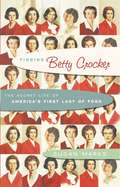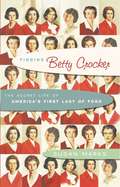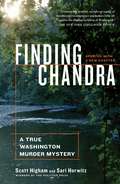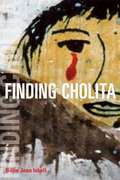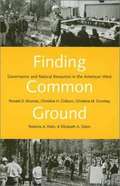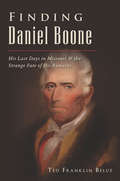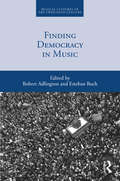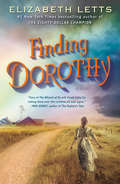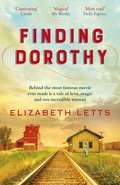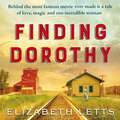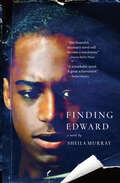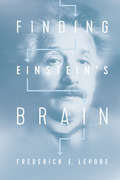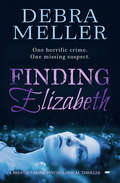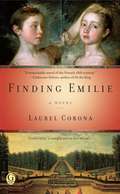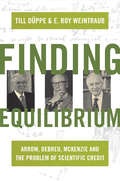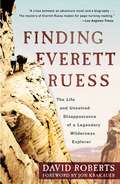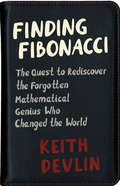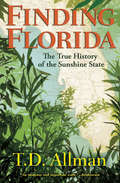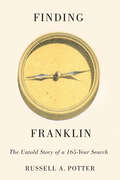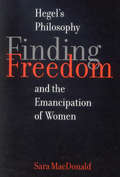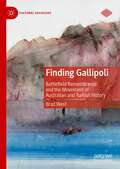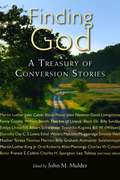- Table View
- List View
Finding Betty Crocker: The Secret Life of America's First Lady of Food
by Susan MarksIn 1945, Betty Crocker was bested only by Eleanor Roosevelt as the best-known woman in America. Originally published in hardcover by Simon and Schuster in 2005, this edition traces Betty Crocker's story from her "birth" in 1921, evolving brand persona, test kitchens, and connection to generations of American women in the context of societal trends. Marks, director of the documentary film The Betty Mystique, includes recipes and period illustrations. Annotation ©2007 Book News, Inc. , Portland, OR (booknews. com)
Finding Betty Crocker
by Susan MarksIN 1945, FORTUNE MAGAZINE named Betty Crocker the second most popular American woman, right behind Eleanor Roosevelt, and dubbed Betty America's First Lady of Food. Not bad for a gal who never actually existed. "Born" in 1921 in Minneapolis, Minnesota, to proud corporate parents, Betty Crocker has grown, over eight decades, into one of the most successful branding campaigns the world has ever known. Now, at long last, she has her own biography. Finding Betty Crocker draws on six years of research plus an unprecedented look into the General Mills archives to reveal how a fictitious spokesperson was enthusiastically welcomed into kitchens and shopping carts across the nation. The Washburn Crosby Company (one of the forerunners to General Mills) chose the cheery all-American "Betty" as a first name and paired it with Crocker, after William Crocker, a well-loved company director. Betty was to be the newest member of the Home Service Department, where she would be a "friend" to consumers in search of advice on baking -- and, in an unexpected twist, their personal lives. Soon Betty Crocker had her own national radio show, which, during the Great Depression and World War II, broadcast money-saving recipes, rationing tips, and messages of hope. Over 700,000 women joined Betty's wartime Home Legion program, while more than one million women -- and men -- registered for the Betty Crocker Cooking School of the Air during its twenty-seven-year run. At the height of Betty Crocker's popularity in the 1940s, she received as many as four to five thousand letters daily, care of General Mills. When her first full-scale cookbook, Betty Crocker's Picture Cook Book, or "Big Red," as it is affectionately known, was released in 1950, first-year sales rivaled those of the Bible. Today, over two hundred products bear her name, along with thousands of recipe booklets and cookbooks, an interactive website, and a newspaper column. What is it about Betty? In answering the question of why everyone was buying what she was selling, author Susan Marks offers an entertaining, charming, and utterly unique look -- through words and images -- at an American icon situated between profound symbolism and classic kitchen kitsch.
Finding Chandra
by Sari Horwitz Scott HighamIt was the mystery that gripped the nation during the summer of 2001: the sudden disappearance of Chandra Levy, a young, promising intern, and the possible involvement of Congressman Gary Condit. And then the case went cold. By 2007, satellite trucks and reporters had long since abandoned the story of the congressman and the intern in search of other news, fresh scandals. Across the country, Chandra's parents tried to resume their daily lives, desperately hoping that someday there might be a break in the investigation.And in Washington, the old game of who's up and who's down played on without interruption. But Chandra Levy haunted. Six years after the young intern's disappearance, investigative editors of the Washington Post pitched two Pulitzer Prize- winning reporters their idea: Revisit the unsolved case and find out what happened to Chandra, a task that had eluded police and the FBI. Scott Higham and Sari Horwitz went to work. e result was a thirteen-part series in the Washington Post that focused on a prime suspect the police and the FBI had passed over years before. They had wrongly pursued Condit and chased numerous false leads, including a claim that Chandra had been kidnapped and taken to the Middle East. But the most likely culprit was far less glamorous: an immigrant from El Salvador, a young man in the clutches of alcohol, drugs, and violence who had been stalking the running paths of Rock Creek Park, assaulting female joggers at knifepoint. He had attacked again, even as the police and the press concentrated on a congressman romantically linked to the intern. Finding Chandra explores the bungled police efforts to locate the crime scene and catch a killer, the ambition and hubris of Washington's power elite and press corps, the twisted culture of politics, the dark nature of political scandal, and the agony of parents struggling to comprehend the loss of a child. Above all, it is a quintessential portrait of a cast of outsiders who came to Washington with dreams of something better, only to be forever changed.
Finding Cholita
by Billie Jean IsbellFinding Cholita is fictionalized ethnography of the Ayacucho region of Peru covering a thirty-year period from the 1970s to today. It is a story of human tragedy resulting from the region's long history of discrimination, class oppression, and then the rise and fall of the communist organization Shining Path. The story's narrator, American anthropologist Dr. Alice Woodsley, attempts to locate her goddaughter, Cholita, who is known to have joined Shining Path and to have murdered her biological father, who fathered her through rape. Searching for Cholita, Woodsley devotes herself to documenting the stories of the countless Andean peasant women who were raped by soldiers, often going beyond witnessing as she helps the women relieve the pain of their sexual horror.
Finding Common Ground: Governance and Natural Resources in the American West
by Ronald D. Brunner Christine H. Colburn Christina M. Cromley Roberta A. KleinOver the past century, solutions to natural resources policy issues have become increasingly complex. Multiple government agencies with overlapping jurisdictions and differing mandates as well as multiple interest groups have contributed to gridlock, frequently preventing solutions in the common interest. Community-based responses to natural resource problems in the American West have demonstrated the potential of local initiatives both for finding common ground on divisive issues and for advancing the common interest. The first chapter of this enlightening book diagnoses contemporary problems of governance in natural resources policy and in the United States generally, then introduces community-based initiatives as responses to those problems. The next chapters examine the range of successes and failures of initiatives in water management in the Upper Clark Fork River in Montana; wolf recovery in the northern Rockies; bison management in greater Yellowstone; and forest policy in northern California. The concluding chapter considers how to harvest experience from these and other cases, offering practical suggestions for diverse participants in community-based initiatives and their supporters, agencies and interest groups, and researchers and educators.
Finding Daniel Boone: His Last Days in Missouri & the Strange Fate of His Remains (American Legends)
by Ted Franklin BelueFollow the final days of an American frontier icon as a historian examines what happened to him after he died.Finding Daniel Boone is a unique tribute to America’s frontier hero and offers closure to the greatest of all his mysteries: where he was buried. Part biography, part historical travelogue, and eloquently narrated using fresh sources, rare forensic data, and new field interviews, this is more than just a search for a man’s bones. Fully re-creating Daniel’s lost world, noted historian and author Ted Franklin Belue journeys along the famous Pathfinder’s last trail, from Missouri and back to Kentucky, meeting a host of colorful characters. As little has been written about Boone’s western days, where he lived the longest, this work examines the legendary woodsman’s life as much as his death.“With vivid writing, and ample historic documentation, Ted Franklin Belue invites readers on an incredible journey that introduces them to a new slant on an old story about one of the greatest American frontier heroes. Belue tirelessly re-creates Boone’s lost world and follows his last trail in the year of his death’s bicentennial, teasing us with a provocative question: Where does Daniel Boone rest, in Missouri or Kentucky?” —KYForward
Finding Democracy in Music (Musical Cultures of the Twentieth Century)
by Edited by Robert Adlington and Esteban BuchFor a century and more, the idea of democracy has fuelled musicians’ imaginations. Seeking to go beyond music’s proven capacity to contribute to specific political causes, musicians have explored how aspects of their practice embody democratic principles. This may involve adopting particular approaches to compositional material, performance practice, relationships to audiences, or modes of dissemination and distribution. Finding Democracy in Music is the first study to offer a wide-ranging investigation of ways in which democracy may thus be found in music. A guiding theme of the volume is that this takes place in a plurality of ways, depending upon the perspective taken to music’s manifold relationships, and the idea of democracy being entertained. Contributing authors explore various genres including orchestral composition, jazz, the post-war avant-garde, online performance, and contemporary popular music, as well as employing a wide array of theoretical, archival, and ethnographic methodologies. Particular attention is given to the contested nature of democracy as a category, and the gaps that frequently arise between utopian aspiration and reality. In so doing, the volume interrogates a key way in which music helps to articulate and shape our social lives and our politics.
Finding Dorothy: A Novel
by Elizabeth Letts<p>Hollywood, 1938: As soon as she learns that M-G-M is adapting her late husband’s masterpiece for the screen, seventy-seven-year-old Maud Gage Baum sets about trying to finagle her way onto the set. Nineteen years after Frank’s passing, Maud is the only person who can help the producers stay true to the spirit of the book—because she’s the only one left who knows its secrets. <p>But the moment she hears Judy Garland rehearsing the first notes of “Over the Rainbow,” Maud recognizes the yearning that defined her own life story, from her youth as a suffragette’s daughter to her coming of age as one of the first women in the Ivy League, from her blossoming romance with Frank to the hardscrabble prairie years that inspired The Wonderful Wizard of Oz. Judy reminds Maud of a young girl she cared for and tried to help in South Dakota, a dreamer who never got her happy ending. Now, with the young actress under pressure from the studio as well as her ambitious stage mother, Maud resolves to protect her—the way she tried so hard to protect the real Dorothy. <p>The author of two New York Times bestselling nonfiction books, The Eighty-Dollar Champion and The Perfect Horse, Elizabeth Letts is a master at discovering and researching a rich historical story and transforming it into a page-turner. Finding Dorothy is the result of Letts’s journey into the amazing lives of Frank and Maud Baum. Written as fiction but based closely on the truth, Elizabeth Letts’s new book tells a story of love, loss, inspiration, and perseverance, set in America’s heartland.</p>
Finding Dorothy: behind The Wizard of Oz is a story of love, magic and one incredible woman
by Elizabeth Letts'A captivating and insightful backstage pass into a timeless classic'CandisBehind the most famous movie ever made is a tale of love, magic and one incredible woman Hollywood, 1938: As soon as she learns that M-G-M is adapting her late husband's masterpiece, The Wonderful Wizard of Oz, for the screen, Maud Gage Baum sets about trying to visit the set.Nineteen years after Frank's passing, Maud is the only person who can help the producers stay true to the spirit of the book - because she's the only one left who knows its secrets...But the moment she hears Judy Garland rehearsing the first notes of 'Over the Rainbow', Maud recognizes the yearning that defined her own life story, from her rebellious youth as a suffragette's daughter to her coming of age as one of the first women in the Ivy League, from her blossoming romance with Frank to the hardscrabble prairie years that inspired his famous work. With the young actress under pressure from the studio as well as her ambitious stage mother, Maud resolves to protect her - the way she tried so hard to protect the real Dorothy.This richly imagined novel tells the story behind The Wonderful Wizard of Oz, the book that inspired the iconic film, through the eyes of author L. Frank Baum's intrepid wife, Maud.'Maud's life behind-the-scenes and the making of the film are uncovered in a thrilling, magical way'My Weekly
Finding Dorothy: behind The Wizard of Oz is a story of love, magic and one incredible woman
by Elizabeth LettsBehind the most famous movie ever made is a tale of love, magic and one incredible woman Hollywood, 1938: As soon as she learns that M-G-M is adapting her late husband's masterpiece, The Wonderful Wizard of Oz, for the screen, Maud Gage Baum sets about trying to visit the set.Nineteen years after Frank's passing, Maud is the only person who can help the producers stay true to the spirit of the book - because she's the only one left who knows its secrets...But the moment she hears Judy Garland rehearsing the first notes of 'Over the Rainbow', Maud recognizes the yearning that defined her own life story, from her rebellious youth as a suffragette's daughter to her coming of age as one of the first women in the Ivy League, from her blossoming romance with Frank to the hardscrabble prairie years that inspired his famous work. With the young actress under pressure from the studio as well as her ambitious stage mother, Maud resolves to protect her - the way she tried so hard to protect the real Dorothy.This richly imagined novel tells the story behind The Wonderful Wizard of Oz, the book that inspired the iconic film, through the eyes of author L. Frank Baum's intrepid wife, Maud.(P)2019 Random House Audio
Finding Edward
by Sheila MurrayCyril Rowntree migrates to Toronto from Jamaica in 2012. Managing a precarious balance of work and university he begins to navigate his way through the implications of being racialized in his challenging new land. A chance encounter with a panhandler named Patricia leads Cyril to a suitcase full of photographs and letters dating back to the early 1920s. Cyril is drawn into the letters and their story of a white mother’s struggle with the need to give up her mixed race baby, Edward. Abandoned by his own white father as a small child, Cyril’s keen intuition triggers a strong connection and he begins to look for the rest of Edward’s story. As he searches, Cyril unearths fragments of Edward’s itinerant life as he crisscrossed the country. Along the way, he discovers hidden pieces of Canada’s Black history and gains the confidence to take on his new world.
Finding Einstein's Brain
by Dr Frederick E. LeporeAlbert Einstein remains the quintessential icon of modern genius. Like Newton and many others, his seminal work in physics includes the General Theory of Relativity, the Absolute Nature of Light, and perhaps the most famous equation of all time: E=mc2. Following his death in 1955, Einstein’s brain was removed and preserved, but has never been fully or systematically studied. In fact, the sections are not even all in one place, and some are mysteriously unaccounted for! In this compelling tale, Frederick E. Lepore delves into the strange, elusive afterlife of Einstein’s brain, the controversy surrounding its use, and what its study represents for brain and/or intelligence studies. Carefully reacting to the skepticism of 21st century neuroscience, Lepore more broadly examines the philosophical, medical, and scientific implications of brain-examination. Is the brain simply a computer? If so, how close are we to artificially creating a human brain? Could scientists create a second Einstein? This “biography of a brain” attempts to answer these questions, exploring what made Einstein’s brain anatomy exceptional, and how “found” photographs--discovered more than a half a century after his death--may begin to uncover the nature of genius.
Finding Elizabeth: A Breath-Taking Psychological Thriller
by Debra MellerOne horrific crime. One missing suspect. When an officer is called to a house, he discovers a chilling and bizarre crime scene. Sitting at a dining room table, as if enjoying their evening meal, he finds the decomposing bodies of an entire family. Each one murdered and posed like mannequins. The only person missing from the disturbing scene is the family maid, Elizabeth. Detective Richard Crombie is assigned the case but after weeks of pressure and no results, he reluctantly requests the help of criminal psychiatrist, Doctor Killam, who once worked with Scotland Yard. But who did kill the family? Does Elizabeth hold the key to the violent mystery? While the Detective and the Doctor investigate the murders and hunt for the missing maid, it becomes apparent that they are up against a terrifying psychopath who has a thirst for death and no intention of stopping… Told from a unique perspective, as if fiction is fact, Finding Elizabeth will stay with you for a very long time. It's the perfect read for fans of suspenseful thrillers and of historical fiction.
Finding Emilie
by Laurel CoronaWoman is born free, and everywhere she is in corsets. . . . Lili du Châtelet yearns to know more about her mother, the brilliant French mathematician Emilie. But the shrouded details of Emilie's unconventional life--and her sudden death--are elusive. Caught between the confines of a convent upbringing and the intrigues of the Versailles court, Lili blossoms under the care of a Parisian salonnière as she absorbs the excitement of the Enlightenment, even as the scandalous shadow of her mother's past haunts her and puts her on her own path of self-discovery. Laurel Corona's breathtaking new novel, set on the eve of the French Revolution, vividly illuminates the tensions of the times, and the dangerous dance between the need to conform and the desire to chart one's own destiny and journey of the heart.
Finding Emilie
by Laurel CoronaWoman is born free, and everywhere she is in corsets. . . . Lili du Châtelet yearns to know more about her mother, the brilliant French mathematician Emilie. But the shrouded details of Emilie's unconventional life--and her sudden death--are elusive. Caught between the confines of a convent upbringing and the intrigues of the Versailles court, Lili blossoms under the care of a Parisian salonnière as she absorbs the excitement of the Enlightenment, even as the scandalous shadow of her mother's past haunts her and puts her on her own path of self-discovery. Laurel Corona's breathtaking new novel, set on the eve of the French Revolution, vividly illuminates the tensions of the times, and the dangerous dance between the need to conform and the desire to chart one's own destiny and journey of the heart.
Finding Equilibrium: Arrow, Debreu, McKenzie and the Problem of Scientific Credit
by Till Düppe E. Roy WeintraubThe remarkable story and personalities behind one of the most important theories in modern economicsFinding Equilibrium explores the post–World War II transformation of economics by constructing a history of the proof of its central dogma—that a competitive market economy may possess a set of equilibrium prices. The model economy for which the theorem could be proved was mapped out in 1954 by Kenneth Arrow and Gerard Debreu collaboratively, and by Lionel McKenzie separately, and would become widely known as the "Arrow-Debreu Model." While Arrow and Debreu would later go on to win separate Nobel prizes in economics, McKenzie would never receive it. Till Düppe and E. Roy Weintraub explore the lives and work of these economists and the issues of scientific credit against the extraordinary backdrop of overlapping research communities and an economics discipline that was shifting dramatically to mathematical modes of expression.Based on recently opened archives, Finding Equilibrium shows the complex interplay between each man's personal life and work, and examines compelling ideas about scientific credit, publication, regard for different research institutions, and the awarding of Nobel prizes. Instead of asking whether recognition was rightly or wrongly given, and who were the heroes or villains, the book considers attitudes toward intellectual credit and strategies to gain it vis-à-vis the communities that grant it.Telling the story behind the proof of the central theorem in economics, Finding Equilibrium sheds light on the changing nature of the scientific community and the critical connections between the personal and public rewards of scientific work.
Finding Everett Ruess: The Life and Unsolved Disappearance of a Legendary Wilderness Explorer
by David Roberts Jon KrakauerFinding Everett Ruess by David Roberts, with a foreword by Jon Krakauer, is the definitive biography of the artist, writer, and eloquent celebrator of the wilderness whose bold solo explorations of the American West and mysterious disappearance in the Utah desert at age 20 have earned him a large and devoted cult following. More than 75 years after his vanishing, Ruess stirs the kinds of passion and speculation accorded such legendary doomed American adventurers as Into the Wild's Chris McCandless and Amelia Earhart. "I have not tired of the wilderness; rather I enjoy its beauty and the vagrant life I lead, more keenly all the time. I prefer the saddle to the street car and the star sprinkled sky to a roof, the obscure and difficult trail, leading into the unknown, to any paved highway, and the deep peace of the wild to the discontent bred by cities." So Everett Ruess wrote in his last letter to his brother. And earlier, in a valedictory poem, "Say that I starved; that I was lost and weary; That I was burned and blinded by the desert sun; Footsore, thirsty, sick with strange diseases; Lonely and wet and cold . . . but that I kept my dream!" Wandering alone with burros and pack horses through California and the Southwest for five years in the early 1930s, on voyages lasting as long as ten months, Ruess also became friends with photographers Edward Weston and Dorothea Lange, swapped prints with Ansel Adams, took part in a Hopi ceremony, learned to speak Navajo, and was among the first "outsiders" to venture deeply into what was then (and to some extent still is) largely a little-known wilderness. When he vanished without a trace in November 1934, Ruess left behind thousands of pages of journals, letters, and poems, as well as more than a hundred watercolor paintings and blockprint engravings. A Ruess mystique, initiated by his parents but soon enlarged by readers and critics who, struck by his remarkable connection to the wild, likened him to a fledgling John Muir. Today, the Ruess cult has more adherents--and more passionate ones--than at any time in the seven-plus decades since his disappearance. By now, Everett Ruess is hailed as a paragon of solo exploration, while the mystery of his death remains one of the greatest riddles in the annals of American adventure. David Roberts began probing the life and death of Everett Ruess for National Geographic Adventure magazine in 1998. Finding Everett Ruess is the result of his personal journeys into the remote areas explored by Ruess, his interviews with oldtimers who encountered the young vagabond and with Ruess's closest living relatives, and his deep immersion in Ruess's writings and artwork. It is an epic narrative of a driven and acutely perceptive young adventurer's expeditions into the wildernesses of landscape and self-discovery, as well as an absorbing investigation of the continuing mystery of his disappearance. In this definitive account of Ruess's extraordinary life and the enigma of his vanishing, David Roberts eloquently captures Ruess's tragic genius and ongoing fascination.From the Hardcover edition.
Finding Fibonacci: The Quest to Rediscover the Forgotten Mathematical Genius Who Changed the World
by Keith DevlinIn 2000, Keith Devlin set out to research the life and legacy of the medieval mathematician Leonardo of Pisa, popularly known as Fibonacci, whose book Liber abbaci has quite literally affected the lives of everyone alive today. Although he is most famous for the Fibonacci numbers—which, it so happens, he didn't invent—Fibonacci's greatest contribution was as an expositor of mathematical ideas at a level ordinary people could understand. In 1202, Liber abbaci—the "Book of Calculation"—introduced modern arithmetic to the Western world. Yet Fibonacci was long forgotten after his death, and it was not until the 1960s that his true achievements were finally recognized.Finding Fibonacci is Devlin's compelling firsthand account of his ten-year quest to tell Fibonacci's story. Devlin, a math expositor himself, kept a diary of the undertaking, which he draws on here to describe the project's highs and lows, its false starts and disappointments, the tragedies and unexpected turns, some hilarious episodes, and the occasional lucky breaks. You will also meet the unique individuals Devlin encountered along the way, people who, each for their own reasons, became fascinated by Fibonacci, from the Yale professor who traced modern finance back to Fibonacci to the Italian historian who made the crucial archival discovery that brought together all the threads of Fibonacci's astonishing story.Fibonacci helped to revive the West as the cradle of science, technology, and commerce, yet he vanished from the pages of history. This is Devlin's search to find him.
Finding Florida: The True History of the Sunshine State
by T. D. AllmanLonglisted for the National Book Award and a Kirkus Reviews Best Nonfiction Book of the YearOver the centuries, Florida has been many things: an unconquered realm protected by geography, a wilderness that ruined Spanish conquistadors, "god’s waiting room,” and a place to start over. Depopulated after the extermination of its original native population, today it’s home to nineteen million. The site of vicious racial violence, including massacres, slavery, and the roll-back of Reconstruction, Florida is now one of our most diverse states, a dynamic multicultural place with an essential role in 21st-century America.In Finding Florida, journalist T.D. Allman reclaims the remarkable history of Florida from the state’s mythologizers, apologists, and boosters. Allman traces the discovery, exploration, and settlement of Florida, its transformation from a swamp to "paradise.” Palm Beach, Key West, Miami, Tampa, and Orlando boomed, fortunes were won and lost, land was stolen and flipped, and millions arrived. The product of a decade of research and writing, Finding Florida is a highly original, stylish, and masterful work, the first modern comprehensive history of this fascinating place.
Finding Franklin: The Untold Story of a 165-Year Search
by Russell PotterIn 2014 media around the world buzzed with news that an archaeological team from Parks Canada had located and identified the wreck of HMS Erebus, the flagship of Sir John Franklin’s lost expedition to find the Northwest Passage. Finding Franklin outlines the larger story and the cast of detectives from every walk of life that led to the discovery, solving one of the Arctic’s greatest mysteries. In compelling prose, Russell Potter details his decades of work alongside key figures in the era of modern searches and elucidates how shared research and ideas have led to a fuller understanding of the Franklin crew’s final months. Illustrated with images and maps from the last two centuries, Finding Franklin recounts the more than fifty searches for traces of his ships and crew, and the dedicated, often obsessive, men and women who embarked on them. Potter discusses the crucial role that Inuit oral accounts, often cited but rarely understood, played in all of these searches, and continue to play to this day, and offers historical and cultural context to the contemporary debates over the significance of Franklin’s achievement. While examination of HMS Erebus will undoubtedly reveal further details of this mystery, Finding Franklin assembles the stories behind the myth and illuminates what is ultimately a remarkable decades-long discovery.
Finding Franklin: The Untold Story of a 165-Year Search
by Russell A. PotterIn 2014 media around the world buzzed with news that an archaeological team from Parks Canada had located and identified the wreck of HMS Erebus, the flagship of Sir John Franklin’s lost expedition to find the Northwest Passage. Finding Franklin outlines the larger story and the cast of detectives from every walk of life that led to the discovery, solving one of the Arctic’s greatest mysteries. In compelling and accessible prose, Russell Potter details his decades of work alongside key figures in the era of modern searches for the expedition and elucidates how shared research and ideas have led to a fuller understanding of the Franklin crew’s final months. Illustrated with numerous images and maps from the last two centuries, Finding Franklin recounts the more than fifty searches for traces of his ships and crew, and the dedicated, often obsessive, men and women who embarked on them. Potter discusses the crucial role that Inuit oral accounts, often cited but rarely understood, played in all of these searches, and continue to play to this day, and offers historical and cultural context to the contemporary debates over the significance of Franklin’s achievement. While examination of HMS Erebus will undoubtedly reveal further details of this mystery, Finding Franklin assembles the stories behind the myth and illuminates what is ultimately a remarkable decades-long discovery.
Finding Freedom
by Sara MacdonaldCombining a detailed study of Hegel's political philosophy with close readings of two important literary works that help clarify his thought, MacDonald traces the historical development of an enduring link between personal lives and stable political communities. While Sophocles' Antigone highlights the tension in states that deny the interests of their citizens, MacDonald shows that Shakespeare's A Midsummer Night's Dream offers an alternative image, one that sees freedom for all as essential to an ethical family and state and is consistent with Hegel's thought in both the Phenomenology of Spirit and The Philosophy of Right.
Finding Freedom: Hegel's Philosophy and the Emancipation of Women (McGill-Queen's Studies in the History of Ideas #45)
by Sara MacDonaldCombining a detailed study of Hegel's political philosophy with close readings of two important literary works that help clarify his thought, MacDonald traces the historical development of an enduring link between personal lives and stable political communities. While Sophocles' Antigone highlights the tension in states that deny the interests of their citizens, MacDonald shows that Shakespeare's A Midsummer Night's Dream offers an alternative image, one that sees freedom for all as essential to an ethical family and state and is consistent with Hegel's thought in both the Phenomenology of Spirit and The Philosophy of Right.
Finding Gallipoli: Battlefield Remembrance and the Movement of Australian and Turkish History (Cultural Sociology)
by Brad WestThis book is about how Australian and Turkish historical understanding of the First World War Gallipoli Campaign has been shaped by travel to the battlefield for the purposes of commemoration. Utilizing a cultural historical method, the study begins with examining how cultural conceptions of travel influenced the experience of those fighting in the 1915 Battle, and ends with the way that new global insecurities and the withdrawal of Western troops from Afghanistan in 2021 is reflecting and influencing Australia and Turkey’s social memory of their military past. This wide historical lens and the author’s original fieldwork and analysis of documents allows for an in-depth exploration of the ways in which cultural patterns of social memory develop over time and mapping of how specific cultural representations in the past are reclaimed. The book argues that travel is a key factor influencing social change by providing distinctive ritual experiences that afford unique, discursive opportunities and empowering particular carriers and custodians of social memory.
Finding God: A Treasury of Conversion Stories
by John M. MulderThe search for God is a staple of human history. Finding God records sixty first-person accounts of Christians who found God in different ways and the impact this discovery made on their lives and on the world in which they lived. Ranging from the first century to the present, Finding God is a fascinating digest of conversion stories from a wide variety of people -- from the apostle Paul to the rock musician Bono. These narratives together demonstrate the remarkable diversity of spiritual journeys and the dramatic changes that can result from encounters with God. Both instructive and inspirational, Finding God will expand horizons and deepen the faith of those who seek insight into the age-old spiritual quest to find God.
